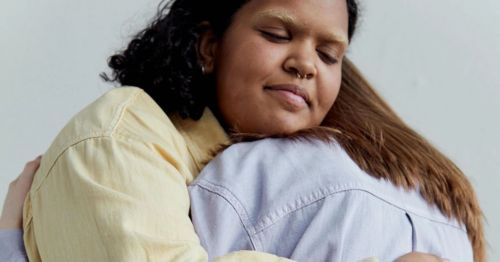
Table of Contents
Why Chosen Family Is Important During the Holidays (and Year Round)

Written By: Ashley Laderer

Clinically Reviewed By: Dr. Don Gasparini
Updated: October 26, 2023
6 min.
The concept of chosen families comes from the LGBTQIA+ community, but anyone who doesn’t feel completely accepted by their relatives may benefit from these nonkinship ties.
Learn more about our Clinical Review Process
Table of Contents
Society and the media put a lot of importance on family ties and family bonding, especially around the holidays. However, it’s no secret that many teens and young adults have strained relationships with their biological family members, whether that means their parents, grandparents, siblings, or extended family. If this applies to you, it can make your holiday season feel bleak, and you may get hit extra hard by the holiday blues.
Biological family relationships may be strained due to a variety of factors. Maybe you don’t feel comfortable opening up to your family members, you feel misunderstood by them, or you feel like they don’t accept you for who you truly are. Unfortunately, this is quite common––but many people have found solace outside of blood relatives.
Enter: chosen families.
What is a chosen family?
Experts in the field have defined chosen families as “nonbiological kinship bonds, whether legally recognized or not, deliberately chosen for the purpose of mutual support and love.” Basically, these are the people who understand you, lift you up, celebrate you, help you, and love you, even without biological ties. On the flip side, you’re there for them, too.
Just like biological families, every chosen family is different. The beauty of chosen families is that their structure and members are entirely up to you. You may not be able to choose your blood relatives, but you can certainly handpick your chosen family members based on who you get along with and who makes you feel seen, heard, and supported.
The concept of chosen families comes from the LGBTQIA+ community because many in this community are unfortunately misunderstood and sometimes even rejected by their biological families. According to recent research from The Trevor Project, only 37% of LGBTQIA+ youth feel like their home is an LGBTQIA+-affirming space. Furthermore, among transgender and nonbinary youth specifically, less than one in three people believe their home to be gender-affirming. Unsurprisingly, this can take its toll on mental health; that’s where chosen families come in.

Support from people who understand and accept you
Personalized, LGBTQIA+-affirming therapy that fits your unique needs
For many teens and young adults, their closest friends act as chosen family members. Or, your chosen family might consist of more distant relatives who you feel closer to than your immediate family. There really are no rules when it comes to cultivating your chosen family. Follow your heart and go with what feels right for you.
The term “chosen family” has made its mark on pop culture –– specifically in the LGBTQIA+ space. For example, singer Rina Sawayama teamed up with Elton John (both advocates and members of the LGBTQIA+ community) for a duet of Sawayama’s original song, “Chosen Family.” The lyrics embody the experience of having a chosen family.
The lyrics of the chorus are:
“We don’t need to be related to relate
We don’t need to share genes or a surname
You are
You are
My chosen
Chosen family
So what if we don’t look the same?
We been going through the same thing
You are
You are
My chosen
Chosen family”
Who benefits from a chosen family?
In addition to LGBTQIA+ people, anyone who doesn’t feel completely understood or accepted by their relatives may benefit from having a chosen family. One example of this is people who struggle with mental health conditions such as anxiety disorders, depression, or post-traumatic stress disorder (PTSD). If a young person has a family that brushes off their mental health struggles or invalidates them, it can be extremely isolating. Connecting with chosen family members who understand and validate mental health concerns can provide much-needed support and make all the difference.
All of this being said, even people who have good relationships with their biological family can have a chosen family, too. This simply lends itself to double the love and support that one receives and provides.
What are the benefits of having a chosen family?
There are endless benefits to having a loving, supportive, chosen family. They can provide you with what you are lacking or aren’t receiving from your biological family or provide you more good on top of the good you’re already getting from your blood relatives.
Some examples of the many benefits of chosen families include having people who:
- Can cheer you up when you’re feeling down
- Understand the unique struggles you face
- Validate your life experiences
- Affirm your sexual and/or gender identity
- You can call in case of emergency
- You can confide in
- You can trust
- You can share your successes with
- You can celebrate birthdays and holidays with
Of course, every healthy relationship is a two-way street. What you are receiving, you should also give back. Let each chosen family member know how much they mean to you, and tell them that you are here to support them however you can. Offer up your help when they’re going through hard times, be a shoulder to cry on, and cheer them on through their victories.
How to celebrate the holidays with your chosen family
Despite the pressure put on us by society and all the expectations that the media set, holiday celebrations don’t have to be traditional. In fact, the “traditional” celebrations during the holiday season can be very anxiety and stress-inducing for some people.
There is no singular “right way” to celebrate any given holiday –– whether that’s Hanukkah, Christmas, Kwanzaa, or New Year’s Eve. You should be able to enjoy the holidays rather than dread them, and if that means celebrating in a non-traditional way, roll with it.
Your plans may vary depending on whether or not you live with your family and your relationship with them. If possible, you may want to opt out of biological family gatherings altogether. If that’s not possible, you can ask if you can invite a chosen family member or two over to join. This way, you can lean on them for support throughout the events.

If there are obligations you can’t get out of on the day of, you can make plans that are just for you and your chosen family during the surrounding days of a holiday. Some ideas are:
- Potluck dinners
- White elephant gift exchanges
- Community service events
- Movie nights
- Ugly sweater parties
Any of these celebrations don’t have to be big. You can celebrate with just one chosen family member or a small group. It all comes down to what you and your loved ones prefer and enjoy. Have fun making the holiday your own and come up with new traditions that you can look forward to year after year. Don’t forget to use the holidays as an opportunity to show your chosen family how much you love and care for them.
How Charlie Health can help
Even with the support of a solid chosen family, life can be difficult, and mental health conditions are very common. If you’re a teen or young adult who’s struggling with complex mental health challenges, Charlie Health may be able to help.
At our Intensive Outpatient Program (IOP), every client is matched with an individual therapist who fits their specific needs and will also be matched with a group of peers who are from similar backgrounds with similar struggles. Family therapy can also be a part of IOP.
We know that every individual has their own unique mental health journey –– and we acknowledge that groups such as the LGBQTIA+ community face additional barriers to treatment and adequate care. Charlie Health therapists have extensive experience working with LGBTQIA+ teens and young adults, practicing LGBTQIA+ affirming therapy and gender-affirming therapy.
Fill out this short assessment to get started with Charlie Health today.




